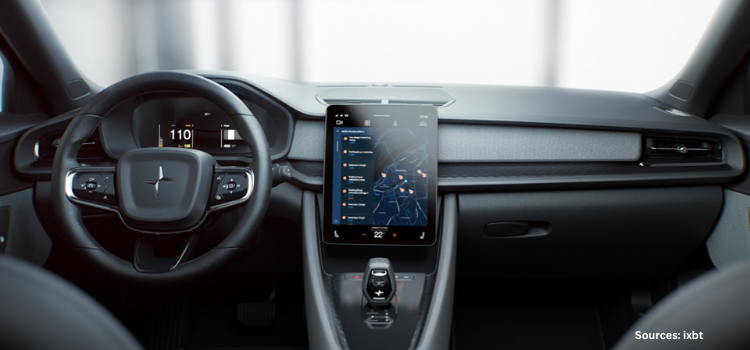
In-Vehicle Ethernet Market by Component (Hardware, Software, and Services), by Bandwidth (10Mbps, 100Mbps, 1Gbps, and 2.5/5/10Gbps), by Vehicle Type (Passenger Cars, Commercial Vehicles, and Farming & Off-highway Vehicles), By Application (Advanced Driver Assistance Systems, Infotainment, Powertrain, Body & Comfort, Chassis, and Others)- Global Opportunity Analysis and Industry Forecast 2024-2030
US Tariff Impact on In-Vehicle Ethernet Market
Trump Tariffs Are Reshaping Global Business
Market Definition
The In-Vehicle Ethernet Market size was valued at USD 2.82 billion in 2023 and is predicted to reach USD 10.54 billion by 2030 with a CAGR of 20.71% from 2024-2030. In-vehicle ethernet, also known as automotive ethernet, is a type of physical communication network technology. It is used to connect components within a car using either a wired or wireless network that enables the transmission of data between multiple electronic devices within a vehicle. It allows different devices to communicate with each other, such as the onboard computer, sensors, displays, camera, and navigation system. In-vehicle ethernet allows for reliable and secure communication between multiple vehicle components to facilitate high-speed data transfer for safety and entertainment systems. It is used in modern vehicles to enable advanced driver assistance systems (ADAS), infotainment systems, and other connected services.
Market Dynamics and Trends
The growing automotive industry and the increasing production of automobiles are significantly boosting the growth of the in-vehicle ethernet market. According to the European Automobile Manufacturers Association, 79.1 million motor vehicles were produced in 2021.
With the increasing number of vehicles, the demand for in-vehicle-ethernet is also increasing, driving the growth of the market. Also, the growing trend of connected & autonomous vehicles due to the growth of advanced driver assistance systems (ADAS), entertainment systems, navigation systems, and connectivity services is driving the growth of the market.
Moreover, the development in automotive ethernet technology such as automotive ethernet 2.0, BroadR-Reach automotive ethernet to allow multiple in-vehicle systems to access information simultaneously is further accelerating the growth of the market.
However, the compatibility issue between different in-vehicle ethernet systems and ethernet’s vulnerability to cyber-attacks are the major factors restraining the growth of the in-vehicle ethernet market. On the contrary, the introduction of micro-electromechanical systems (MEMS) linked to advanced driver-assistance systems (ADAS) to enhance emergency braking, pedestrian detection, parking assist, and driver drowsiness detection is expected to create ample opportunities for the automotive ethernet market in the coming years.
Market Segmentations and Scope of the Study
The in-vehicle ethernet market share is segmented on the basis of component, bandwidth, vehicle type, and application. On the basis of component, the market is divided into hardware, software, and services. On the basis of bandwidth, the market is classified into 10Mbps, 100Mbps, 1Gbps, and 2.5/5/10Gbps. On the basis of vehicle type, the market is segmented into passenger cars, commercial vehicles, and farming & off-highway vehicles. On the basis of application, the market is divided into advanced driver assistance systems, infotainment, powertrain, body & comfort, chassis, and others. Geographic breakdown and analysis of each of the aforesaid segments include regions comprising of North America, Europe, Asia-Pacific, and RoW.
Geographical Analysis
Asia Pacific holds the lion share of in-vehicle ethernet market and is expected to continue its dominance during the forecast period. This is attributed to factors such as the growing automotive manufacturing industries in countries such as China, Japan, and India.
According to the International Organization of Motor Vehicle Manufacturers, China is the largest producer of automotive vehicles, manufacturing more than 21.4 million cars and 4.6 million commercial vehicles in 2021. Also, the rising adoption of advanced driver-assistance systems (ADAS) along with the stringent government policies for road safety in this region is further driving the growth of the market.
For instance, in March 2022, the Indian Ministry of Road Transport and Highway issued a road and vehicle safety policy to create effective public awareness and the use of electronic components and airbags for passenger safety.
On the other hand, North America is expected to show steady growth in the in-vehicle ethernet market due to the rising demand for safe and electronically equipped components in vehicles such as anti-lock braking systems, self-driving features, vehicle-to-everything connectivity, ADAS, and infotainment systems.
Also, the presence of key players such as Microchip Technology and NXP Semiconductors N. V. plays a major role in the development of the in-vehicle ethernet market in this region. For instance, in September 2022, Microchip technology launched a terabit-scale secure ethernet physical layer to support the transition to 112G Pulse Amplitude Modulation 4- level (PAM4) connectivity. Through this launch, the company aims to improve the transmission signal, connectivity, and high data transfer speed across ethernet switching platforms.
Competitive Landscape
Various market players operating in the in-vehicle ethernet market include Vector Informatik GmbH, NXP Semiconductors N. V., Marvell Semiconductor, Inc., Elektrobit, Broadcom Inc., Microchip Technology Inc., Aukua Systems, Keysight Technologies, Cadence Design Systems, Inc, Texas Instruments Incorporated, Cadence Design Systems Inc, TTTech Computertechnik AG, Vector Informatik GmbH, NVIDIA, Delphi Technologies, and others. These market players are adopting various strategies such as product launches to remain dominant in the market.
For instance, in June 2022, Marvell launched an automotive-grade ethernet switch chip named Brightlane Ethernet switch that features higher bandwidth and port counts. The new switch chip supports up to 16 interface ports and Ethernet speeds ranging from 10 Mb/s to 1 Gb/s, as well as an advanced security subsystem to protect against hackers.
Also, in May 2022, Broadcom Inc. launched high bandwidth monolithic automotive Ethernet switch device named BCM8958X. Through this launch, the company aims to provide the growing bandwidth requirement for in-vehicle networking applications.
Moreover, in November 2021, Elektrobit Launched industry-first automotive ethernet switch firmware for secure, high-performance, in-vehicle communications. The new ethernet featured high-speed, high-bandwidth networks necessary for EVs, advanced ADAS, and self-driving vehicles. Furthermore, in February 2020, Marvell Technology Group Ltd. launched the new power-efficient second-generation automotive ethernet physical layer 100BASE-T1 PHY. The new PHY is more optimized and can transmit data from 100 Mbps to multi-gigabytes.
Key Benefits
-
The report provides quantitative analysis and estimations of the in-vehicle ethernet market from 2024 to 2030, which assists in identifying the prevailing market opportunities.
-
The study comprises a deep dive analysis of in-vehicle ethernet market including the current and future trends to depict prevalent investment pockets in the market.
-
Information related to key drivers, restraints, and opportunities and their impact on in-vehicle ethernet market is provided in the report.
-
Competitive analysis of the players, along with their market share is provided in the report.
-
SWOT analysis and Porters Five Forces model is elaborated in the study.
-
Value chain analysis in the market study provides a clear picture of roles of stakeholders.
Key Market Segments
By Component
-
Hardware
-
Software
-
Services
By Bandwidth
-
10Mbps
-
100Mbps
-
1Gbps
-
2.5/5/10Gbps
By Vehicle Type
-
Passenger Cars
-
Commercial Vehicles
-
Farming & Off-highway Vehicles
By Application
-
Advanced Driver Assistance Systems
-
Infotainment
-
Powertrain
-
Body & Comfort
-
Chassis
-
Others
By Geography
-
North America
-
The U.S.
-
Canada
-
Mexico
-
-
Europe
-
The UK
-
Germany
-
France
-
Italy
-
Spain
-
Denmark
-
Netherlands
-
Finland
-
Sweden
-
Norway
-
Russia
-
Rest of Europe
-
-
Asia Pacific
-
China
-
Japan
-
India
-
South Korea
-
Australia
-
Indonesia
-
Singapore
-
Taiwan
-
Thailand
-
Rest of Asia Pacific
-
-
RoW
-
Latin America
-
Middle East
-
Africa
-
Key Players
-
Vector Informatik GmbH
-
NXP Semiconductors N. V.
-
Marvell Semiconductor Inc.
-
Elektrobit
-
Broadcom Inc.
-
Microchip Technology Inc.
-
Aukua Systems
-
Keysight Technologies
-
Cadence Design Systems Inc.
-
Texas Instruments Incorporated
-
Cadence Design Systems Inc.
-
TTTech Computertechnik AG
-
Vector Informatik GmbH
-
NVIDIA
-
Delphi Technologies
REPORT SCOPE AND SEGMENTATION:
|
Parameters |
Details |
|
Market Size in 2023 |
USD 2.82 Billion |
|
Revenue Forecast in 2030 |
USD 10.54 Billion |
|
Growth Rate |
CAGR of 20.71% from 2024 to 2030 |
|
Analysis Period |
2023–2030 |
|
Base Year Considered |
2023 |
|
Forecast Period |
2024–2030 |
|
Market Size Estimation |
Billion (USD) |
|
Growth Factors |
|
|
Countries Covered |
28 |
|
Companies Profiled |
15 |
|
Market Share |
Available for 10 companies |
|
Customization Scope |
Free customization (equivalent up to 80 working hours of analysts) after purchase. Addition or alteration to country, regional, and segment scope. |
|
Pricing and Purchase Options |
Avail customized purchase options to meet your exact research needs. |

















 Speak to Our Analyst
Speak to Our Analyst





















